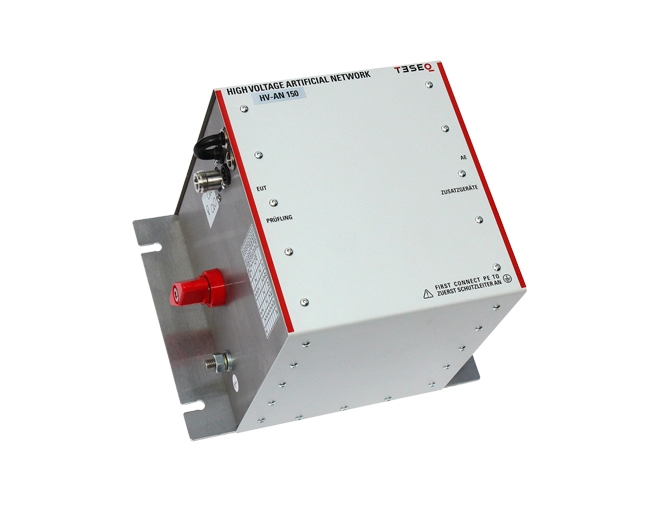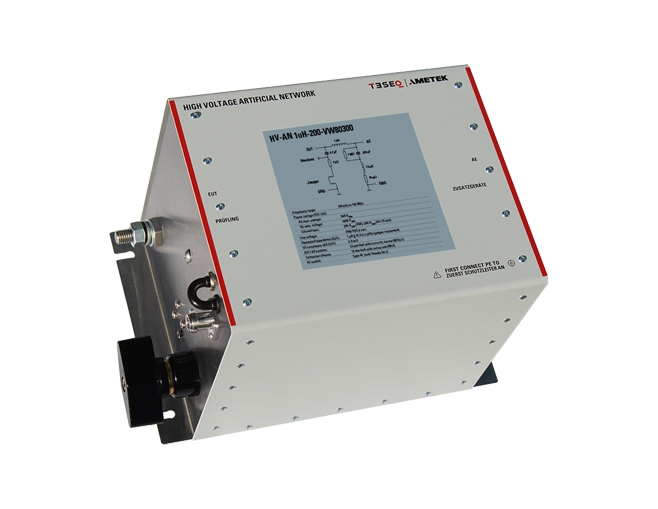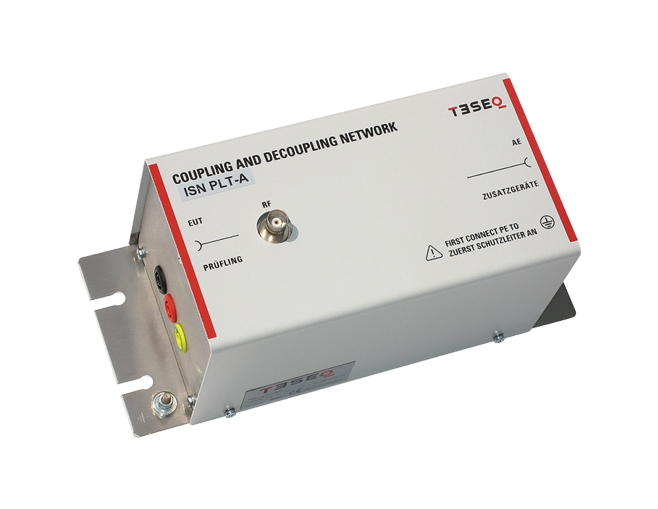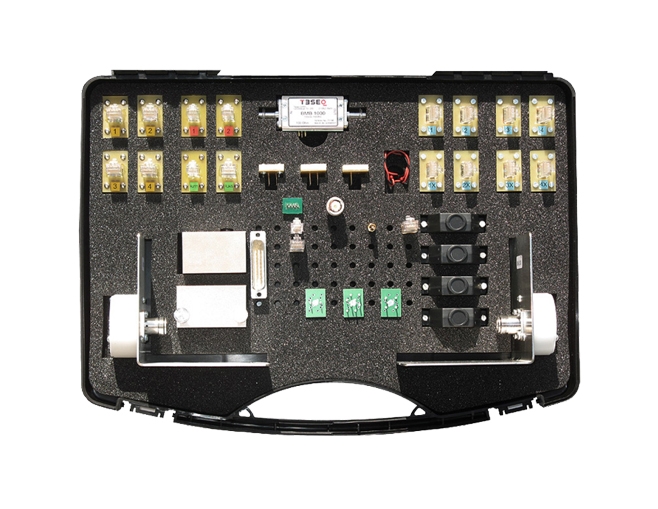Product
ISN
* 총 제품 수 13 개
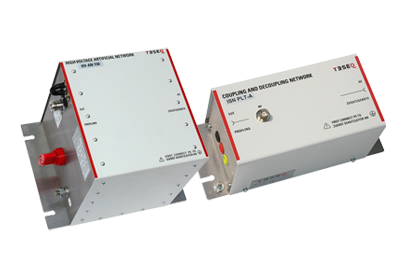
RF HV-AN & ISN
TESEQ은 전기 장비의 주 케이블에서 방해 전압을 측정하기 위고 CISPR 22 및 CISPR 3에 따라 정보 기술 장비(ITE)에서 전도성 공통 모드 방해를 측정하도록 특별히 설계된 라인 임피던스 안정화 네트워크(LISN/AMN/ISN/AAN)의 포괄적인 선택을 제공합니다.
-
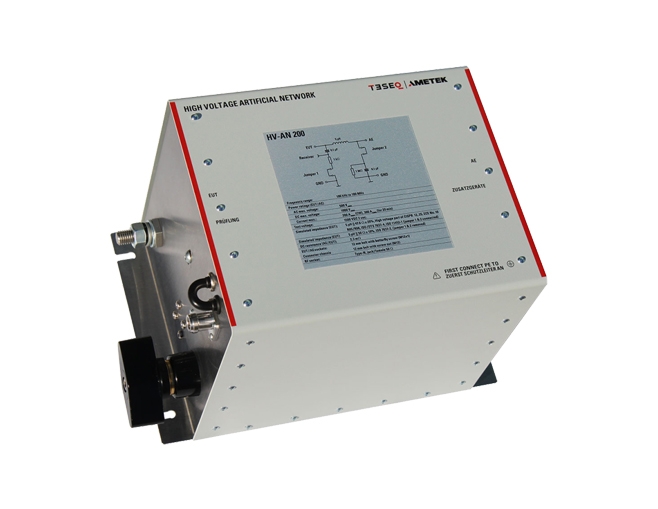
HV-AN 200
㈜이레테크는 고전류 및 고전압 연결이 요구되는 시험 환경에 적합한 신뢰높은 TESEQ(AMETEK CTS)의 HV-AN 200을 제공합니다. HV-AN 200은 차량 하니스의 임피던스를 정밀하게 시뮬레이션하여, EUT(시험 대상 장비)의 실제 동작 조건을 재현하고 검증할 수 있도록 설계되었습니다. 이 장비는 ISO 7637-2, CISPR 12(초안), CISPR 25, ECE R10 Rev.5/Rev.6, ISO 11452-1, ISO/DTS 7637-4의 고전압(HV) 부문 요구사항을 충족하며, 신뢰 높은 EMC 평가를 위한 필수 장비로 다양한 산업 분야에 활용될 수 있습니다.
-
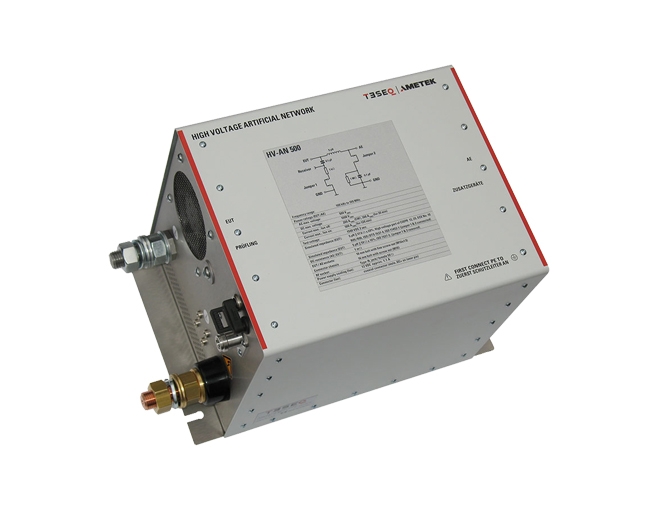
HV-AN 500
㈜이레테크는 EUT(시험 대상 장비) 와의 고전류 및 고전압 연결을 위한 최적의 솔루션인 TESEQ(AMETEK CTS)의 HV-AN 500을 제공합니다. HV-AN 500은 차량 하니스의 임피던스를 정밀하게 시뮬레이션하여 EUT의 실제 동작 특성을 평가하는 데 사용되며, ISO 7637-2, CISPR 12(초안), CISPR 25, ECE R10 Rev.5/Rev.6, ISO 11452-1, ISO/DTS 7637-4 등 주요 국제 표준의 고전압 부문 요구사항을 충족합니다.
또한, 선택 사양인 HV-AN 500-option-1μF는 HV-AN 500의 AE 포트에 연결하여, CISPR 25, ECE R10 Rev.6, ISO 11452-1에 따른 저전압 부문 시험도 수행할 수 있도록 지원합니다. -
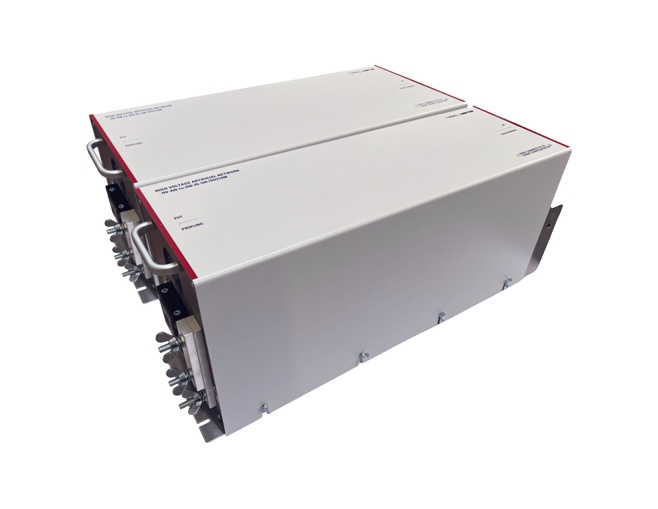
HV-AN 1u-250 ISO21498 Series
㈜이레테크는 전기차 고전압 부품 시험을 위한 신뢰높은 솔루션인 TESEQ(AMETEK CTS)의 HV-AN 1µH-250 ISO 21498를 제공합니다. HV-AN 1µH-250 ISO 21498은 최대 250A DC 전류 조건에서 차량 하니스 및 배터리 임피던스를 정밀하게 시뮬레이션할 수 있도록 설계되었으며, ISO 21498-2, MBN 11123, BMW GS95023 및 이와 유사한 고전압 시험 표준의 요구사항을 충족합니다. HV-AN 1µH-250 ISO 21498은 모듈식 구조를 기반으로 하며, 각 모듈에는 1µH 인덕터, 1µF 커패시터, 지정된 저항값이 포함되어 있습니다. 두 개의 모듈이 한 세트를 구성하여, 고전압 부품의 HV+ 및 HV– 전원 라인에 적용 가능한 완전한 시험 구성을 제공합니다. EUT(시험 대상 장비)의 전류 용량과 요구 저항값에 따라 별도의 맞춤형 세트 구성도 제공되어, 다양한 전기차 시험 조건에 유연하게 대응할 수 있습니다.
-
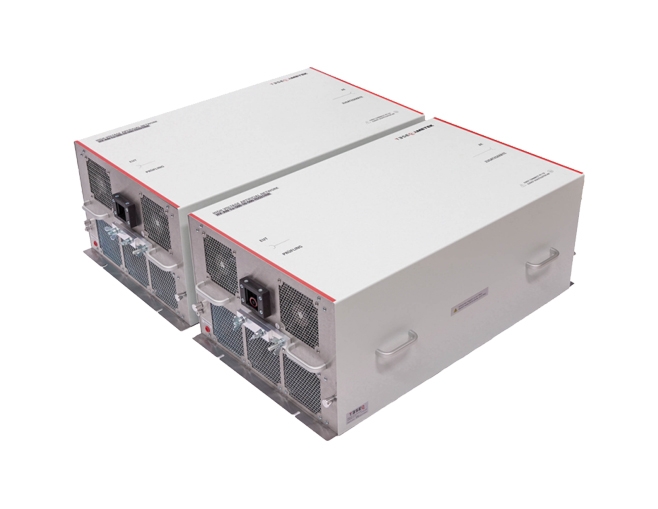
HV-AN 1u-500 ISO21498 Series
㈜이레테크는 전기차 고전압 부품 시험을 위한 신뢰높은 솔루션인 TESEQ(AMETEK CTS)의 HV-AN 1µH-500 ISO 21498를 제공합니다. HV-AN 1µH-250 ISO 21498은 최대 500A DC 전류 조건에서 차량 하니스 및 배터리 임피던스를 정밀하게 시뮬레이션할 수 있도록 설계되었으며, ISO 21498-2, MBN 11123, BMW GS95023 및 이와 유사한 고전압 시험 표준의 요구사항을 충족합니다. HV-AN 1µH-500 ISO 21498은 모듈식 구조를 기반으로 하며, 각 모듈에는 1µH 인덕터, 1µF 커패시터, 지정된 저항값이 포함되어 있습니다. 두 개의 모듈이 한 세트를 구성하여, 고전압 부품의 HV+ 및 HV– 전원 라인에 적용 가능한 완전한 시험 구성을 제공합니다. EUT(시험 대상 장비)의 전류 용량과 요구 저항값에 따라 별도의 맞춤형 세트 구성도 제공되어, 다양한 전기차 시험 조건에 유연하게 대응할 수 있습니다.
-
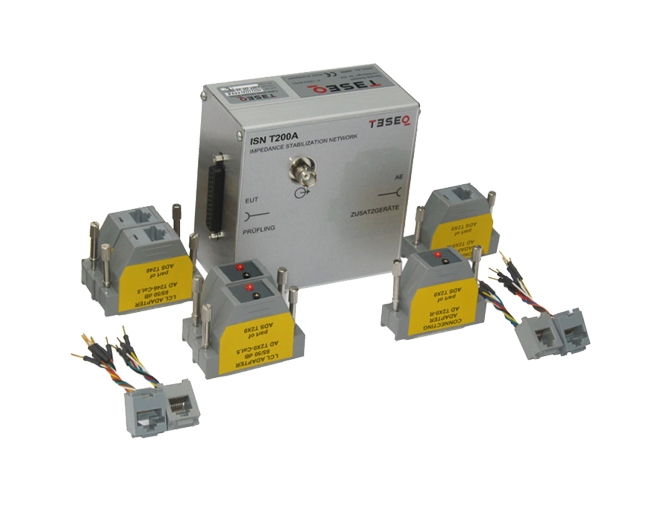
ISN T2 Series
임피던스 안정화 회로망(ISN)는 CISPR 16-1-2에서 비대칭의사회로망 (AAN) 로도 명명되며, CISPR 22 및 CISPR 32에서 요구하는 정보기기(ITE)의 전도성 공통 모드 간섭 측정을 위해 정의된 장비입니다. ISN은 EUT(시험 대상 장비)의 정상적인 동작을 위해 필요한 관련 장비(AE) 또는 부하 사이에 연결됩니다. 측정 중 ISN은 EUT 통신 포트의 공통 모드 종단 임피던스를 설정하며, 연결된 통신 라인의 비대칭 특성(종변환손실, LCL)을 시뮬레이션 합니다. 라인 유형, 라인 수, 핀 배열 등에 따라 다양한 ISN 모델이 제공되어, 시험 환경에 맞는 최적의 구성을 선택할 수 있습니다.
ISN T2A는 차폐되지 않은 단일 밸런스드 페어에 대한 측정을 위해 설계된 장비로, D-sub 25 커넥터가 장착된 기본 네트워크(ISN T200A)와 전용 어댑터 세트로 구성되어 있습니다. 어댑터 세트는 사용된 케이블 카테고리(cat. 3, cat. 5)에 따라 피시험기기(EUT) 측의 종변환손실(LCL) 요구사항을 충족시키기 위한 LCL 어댑터와, 관련 장비(AE) 측 연결을 위한 어댑터로 구성됩니다.
-
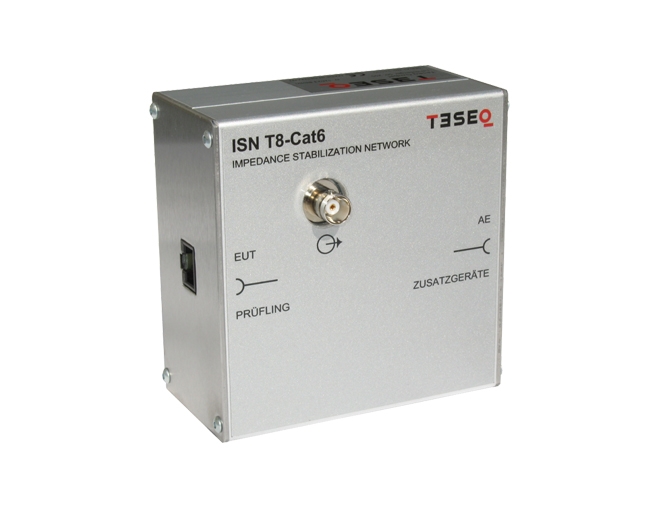
ISN T8-Cat6 Series
임피던스 안정화 회로망(ISN)는 CISPR 16-1-2에서 비대칭의사회로망 (AAN) 로도 명명되며, CISPR 22 및 CISPR 32에서 요구하는 정보기기(ITE)의 전도성 공통 모드 간섭 측정을 위해 정의된 장비입니다. ISN은 피시험기기(EUT)의 정상적인 동작을 위해 필요한 관련 장비(AE) 또는 부하 사이에 연결됩니다. 측정 중 ISN은 EUT 통신 포트의 공통 모드 종단 임피던스를 설정하며, 연결된 통신 라인의 비대칭 특성(종변환손실, LCL)을 시뮬레이션합니다. 라인 유형, 라인 수, 핀 배열 등에 따라 다양한 ISN 모델이 제공되어, 시험 환경에 맞는 최적의 구성을 선택할 수 있습니다.
ISN T8-Cat6는 카테고리 6 케이블에 해당하는 최대 4개의 차폐되지 않은 단일 밸런스드 페어 측정을 위해 설계되었습니다.
또한, 이 장비는 IEC/EN 61000-4-6에 따라 80 MHz까지의 내성 시험을 수행할 수 있는 커플링/디커플링 네트워크(CDN)로도 활용이 가능합니다.
-
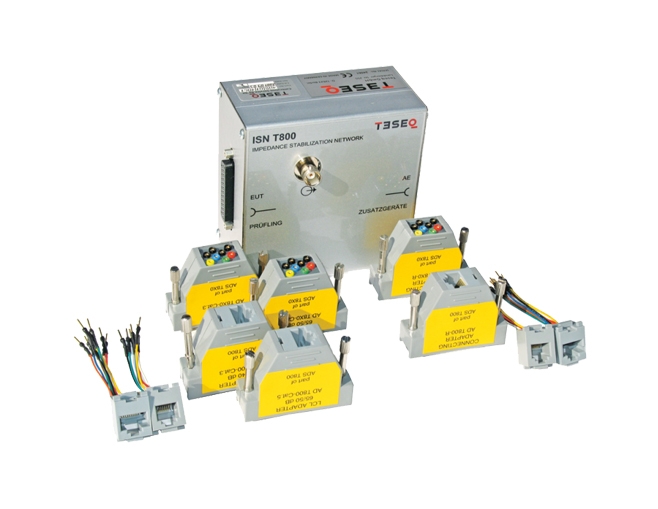
ISN T8 Series
임피던스 안정화 회로망(ISN)는 CISPR 16-1-2에서 비대칭의사회로망 (AAN) 로도 명명되며, CISPR 22 및 CISPR 32에서 요구하는 정보기기(ITE)의 전도성 공통 모드 간섭 측정을 위해 정의된 장비입니다. ISN은 피시험기기(EUT)의 정상적인 동작을 위해 필요한 관련 장비(AE) 또는 부하 사이에 연결됩니다. 측정 중 ISN은 EUT 통신 포트의 공통 모드 종단 임피던스를 설정하며, 연결된 통신 라인의 비대칭 특성(종변환손실, LCL)을 시뮬레이션합니다. 라인 유형, 라인 수, 핀 배열 등에 따라 다양한 ISN 모델이 제공되어, 시험 환경에 맞는 최적의 구성을 선택할 수 있습니다.
ISN T8은 최대 네 개의 차폐되지 않은 단일 밸런스드 페어 측정을 위해 설계된 장비로, D-sub 25 커넥터가 장착된 기본 네트워크(ISN T800) 와 전용 어댑터 세트로 구성되어 있습니다. 어댑터 세트는 사용된 케이블 카테고리(cat. 3, cat. 5)에 따라, EUT 측의 종방향 변환 손실(LCL) 요구사항을 충족하기 위한 두 개의 LCL 어댑터와 AE 측 연결용 어댑터로 구성되어 있습니다.
㈜이레테크는 다양한 커넥터 환경에 대응할 수 있도록 TESEQ(AMETEK CTS)의 두 가지 어댑터 세트를 제공합니다. 하나는 EIA/TIA T568A 및 T568B 핀 배열을 지원하는 RJ45 소켓용 ADS T800 어댑터 세트와 다른 하나는 RJ11 및 RJ45 커넥터의 각 핀 조합에 대해 1mm 바나나 커넥터를 통해 핀 배열을 유연하게 구성할 수 있는 ADS T8x0 어댑터 세트입니다.
-
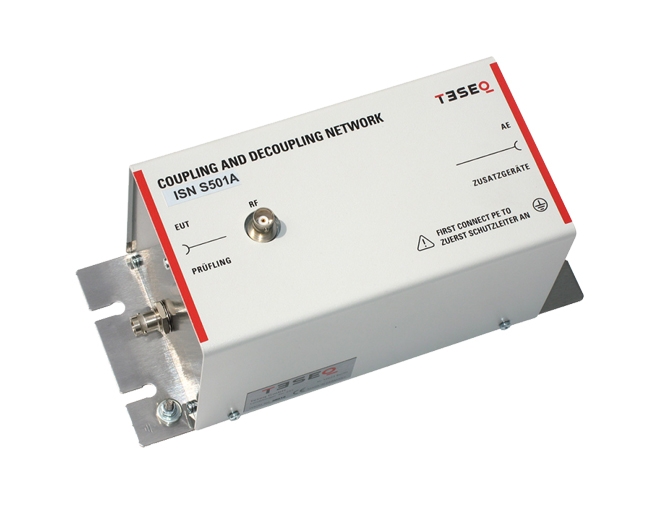
ISN S501A, S502A, S751 and S752
임피던스 안정화 회로망(ISN)는, CISPR 16-1-2에서 AAN(비대칭의사회로망) 또는 AN(동축 및 기타 차폐 케이블용 의사회로망)로도 명명되며, CISPR 22에서 요구하는 정보기기(ITE)의 전도성 공통 모드 간섭 측정을 위해 정의된 장비입니다.
ISN은 EUT(시험 대상 장비)와, 그 정상 동작에 필요한 관련 장비(AE) 또는 부하 사이에 설치되며, 측정 중에는 EUT의 통신 포트에 대해 공통 모드 종단 임피던스를 설정하는 역할을 수행합니다. ISN S501A, S502A, S751, S752는 동축 통신 라인의 전도성 간섭 측정을 위해 설계된 Artificial Network(의사회로망)입니다.
ISN S501A와 S502A는 50Ω 임피던스, S751과 S752는 75Ω 임피던스를 갖는 내부 케이블을 사용하며, 케이블의 차폐층은 AE 측에서 접지됩니다.
또한 ISN S502A 및 S752 모델은 이중 차폐 동축 케이블과 N형 커넥터를 채택하여 보다 향상된 간섭 억제 특성을 제공합니다.
-
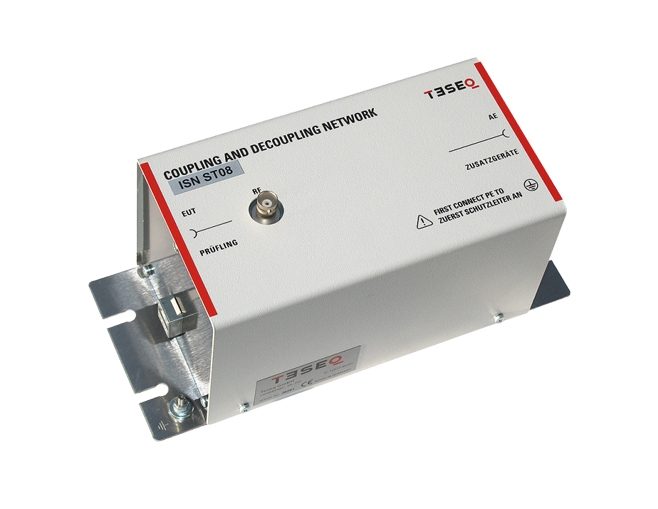
ISN ST08 Series
임피던스 안정화 회로망(ISN)는, CISPR 16-1-2에서 AAN(비대칭의사회로망) 또는 AN(동축 및 기타 차폐 케이블용 의사회로망)로도 명명되며, CISPR 22에서 요구하는 정보기기(ITE)의 전도성 공통 모드 간섭 측정을 위해 정의된 장비입니다. ISN은 EUT(시험 대상 장비)와, 그 정상 동작에 필요한 관련 장비(AE) 또는 부하 사이에 설치되며, 측정 중에는 EUT의 통신 포트에 대해 공통 모드 종단 임피던스를 설정하는 역할을 수행합니다.
ISN ST08은 차폐형 밸런스드 라인 측정을 위한 장비로, 모든 내부 구성 부품이 Cat.6 이상 사양을 충족하며, 100Ω 대칭 임피던스를 갖습니다. RJ45 소켓은 EIA/TIA 568B 핀 배열을 기준으로 설계되었으며, 본 장비는 CISPR 22, EN 55022, CISPR 32, EN 55032, CISPR 16-1-2, EN 55016-1-2 등 다양한 국제 EMC 표준 요구사항을 충족합니다.
비차폐 밸런스드 라인을 위한 ISN T 시리즈와는 달리, ISN ST08은 종변환손실 (LCL) 설정을 위한 별도의 어댑터 없이도 시험이 가능합니다.


